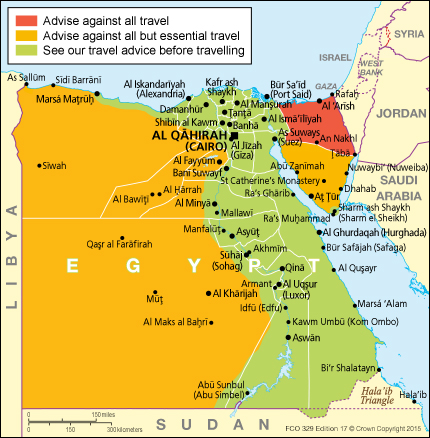Egypt - travel advice from the Foreign Office
Summary

The Foreign and Commonwealth Office (FCO) advise against all travel to the Governorate of North Sinai.
The FCO advise against all but essential travel to:
- the Governorate of South Sinai, except the area within the Sharm el Sheikh perimeter barrier, which includes the airport and the areas of Sharm el Maya, Hadaba, Naama Bay, Sharks Bay and Nabq.
- the area west of the Nile Valley and Nile Delta regions, excluding the coastal areas between the Nile Delta and Marsa Matruh (as shown on the map).
For more information, see Local travel
An estimated 415,000 British nationals visited Egypt in 2018. Most visits are trouble free.
Following the death of Iranian General Qasem Soleimani in a US strike in Baghdad on 3 January, the incident has led to increased tensions in the region. There is a possibility of an increased threat against Western interests and the security situation could worsen with little warning. You should remain vigilant and keep up to date with the latest developments, including via the media and this travel advice.
Terrorists are very likely to try to carry out attacks in Egypt. There is considered to be a heightened threat of terrorist attack globally against UK interests and British nationals, from groups or individuals motivated by the conflict in Iraq and Syria.
Although most attacks occur in North Sinai, there is a risk of terrorist attacks across the country. Attacks could be indiscriminate, affecting Egyptian security forces, religious sites, large public gatherings and places visited by foreigners. There is a heightened threat of terrorist attacks in or around religious sites and during religious festivals, such as the month of Ramadan and the Christmas period (including Coptic Christmas), when terrorist groups have sometimes called for attacks. Terrorist attacks have occurred over local holiday weekends. Terrorists have attacked tourists in Egypt in the past. There is a heightened threat of terrorist attacks targeting Coptic Christians from extremists linked to Daesh-Sinai in Egypt.
You should follow the advice of Egyptian authorities, remaining particularly vigilant and maintaining a high level of security awareness in crowded places and at large gatherings. You can find a list of public holidays on the British Embassy Cairo website. The authorities in Egypt maintain a significant security presence across the country, including armed security officers stationed at important sites, critical infrastructure, and road checkpoints. Extra measures are in place at tourist sites. See Terrorism
Following the crash of a St Petersburg-bound flight in North Sinai in October 2015, direct flights between the UK and Sharm el Sheikh were suspended. The UK government has worked with Egyptian authorities to enable flights to resume, and on 22 October 2019 the restrictions were lifted. You should check with your airline or tour operator for information on services.
There remains a heightened risk of terrorism against aviation in Egypt. Additional security measures are in place for flights departing from Egypt to the UK. You should co-operate fully with security officials at airports. See Terrorism and Air travel
British passport holders travelling to Egypt normally need a visa. See Visas
The Egyptian authorities have suspended diplomatic relations with Qatar. If you have a query relating to your travel plans, you should contact your airline or tour operator.
To contact the emergency services call 122 (police), 123 (ambulance) or 180 (fire).
If you’re abroad and you need emergency help from the UK government, contact the nearest British embassy, consulate or high commission. Consular support is severely limited in parts of Egypt where we advise against all travel and limited where we advise against all but essential travel.
Take out comprehensive travel and medical insurance before you travel.



